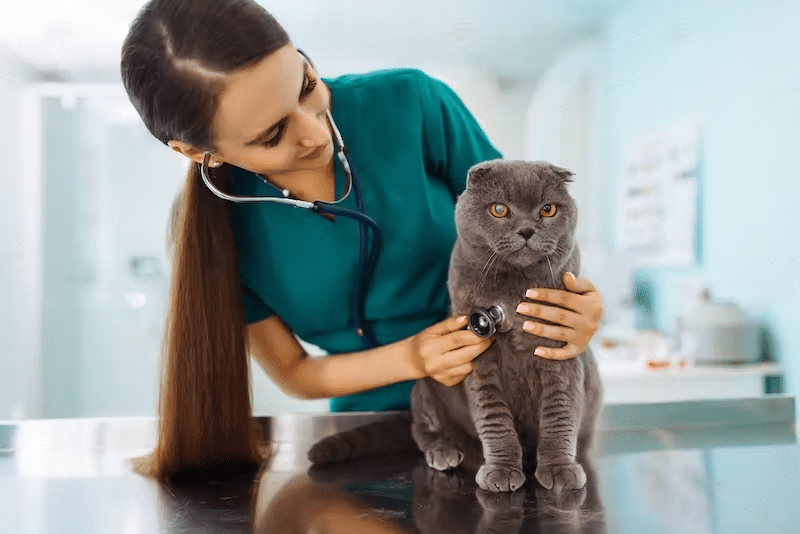A tick is a tiny arachnid that feeds on the blood of animals, most of which are mammals such as cats and birds.
When a tick infestation in a cat goes untreated, it can lead to a number of health issues. Here are some of the problems that can emerge if ticks are not treated in your pet:
- Seeing as ticks feed on the blood of your cat, if they are not taken care of, your cat can become anaemic. Anaemia can lead to lethargy, weakness, and other serious health problems.
- Ticks are well-known for spreading illnesses such as Lyme disease and Rocky Mountain spotted fever. These disorders can be fatal to your cat, causing fevers, joint discomfort, exhaustion, and death.
- In rare cases, ticks can cause a phenomenon called ‘tick paralysis’. This is a condition in which the toxins produced by ticks affect the cat’s nervous system. This can cause weakness, tremors, and in severe cases, paralysis.
By regularly checking your cats for ticks and treating them when you do find ticks, you can prevent your cat from experiencing these symptoms.
How To Prevent A Tick Infestation In Your Cat

Veterinarian doctor wearing face mask checking the ears of cat of the breed Cornish Rex with otoscope in veterinary clinic during covid epidemic. Veterinary aid for pets. Pet health.[/caption]
Before we get to listing the best tick medicine for cats, we would like to start by telling you how you can prevent a tick infestation in your cat. By using these techniques, you can protect your cat from ticks;
Tick Preventative Products
There are a variety of tick prevention products available for cats, including topical treatments, collars, and oral medications. These products are designed to repel ticks and prevent infestations. If you would like to find out which tick prevention product fits the needs and behaviours of your cat, it is best to talk to a veterinarian.
Keep Your Yard Tidy
Ticks thrive in tall grass and other vegetation, so make sure to keep your yard trimmed and clear of debris. This will help reduce the number of ticks in your outdoor environment and reduce the chance of your cat getting ticks when going to play outside in your garden.
Things To Consider Before Getting Tick Medicine
Different tick medicines are suited for different types of cats. Here are some things to consider while deciding which tick treatment to use;
- Some medicines can only be used if your cat is younger than eight weeks and less than 1.5 pounds.
- Some medicines are only effective against particular tick species, so make sure to know which ticks are most commonly found in your area so that you can choose the right medicine.
- Some medicines cannot be used by cats that are pregnant or cats that are lactating. So be sure to check that the medicine you buy will not negatively affect your pregnant cat.
The Best Tick Medicine
These are some of the favourites of cat lovers all over the world, and you may find something useful for your feline friend, so have a look. Here are a few top options that you can use to ensure that your cat is free from ticks.
Frontline Spot On For Cats
This spot-on treatment can be used whether you are looking to protect your cat from ticks or if they have already infested your cat.
This tick medicine kills various pests like fleas, ticks, and even biting lice. It kills fleas in 24 hours and ticks in 48 hours.
It is not suitable for very young kittens; it should only be used on cats older than eight weeks and weighing more than 1kg. It is safe to use on pregnant and nursing cats.
Advocate Cat Tick, Flea and Worm Spot-On Treatment
This tick medicine not only takes care of ticks but also helps you protect and rid your cat of fleas, intestinal worms, lungworms, heartworms, and ear mites. It is safe to use on cats and kittens nine weeks of age.
Biospotix Natural Flea And Tick Repellent Infestations Cat Spray
This is a natural and chemical-free alternative to other sprays. The spray only uses ingredients based on geraniol oit to kill fleas and ticks on contact.
It not only kills fully-formed ticks and fleas by dehydrating the exoskeleton, but it also prevents further infestation by dehydrating any eggs and larvae present.
It is important to note that this spray can cause allergic reactions in cats, so be sure to watch for any symptoms.
Bravecto
Bravecto is one of the most effective medicines for treating black-legged ticks at 12 weeks. This product contains the active ingredient fluralaner, which is in the isoxazoline class of products.
Be sure to keep an eye on any cats with a history of seizures and other neurological disorders when using this brand of medicine.
FAQs
Does tick medicine need to be administered orally or topically?
Whether a specific tick medicine needs to be administered orally or topically will depend on the type of tick medicine you use, as they come in both forms.
The real question that needs to be answered is which form of administration is more effective at getting rid of ticks.
Some studies have found that topical administration of the drug is less painful than oral administration. Studies have also found that oral administration of the drug has a greater effect. One study found that topical administration is 88.4 per cent effective, while oral treatments were 99.9 per cent effective.
How long does it take for a cat to get rid of ticks?
Without the use of any treatment, ticks will only drop off once they have finished feeding. This can take days, and by that time, they may have passed on an infection to your cat.
If you apply a treatment like tick medication, the time it takes for ticks to be eliminated will vary depending on the treatment. Ticks, on the other hand, are normally eradicated between twenty-four and forty-eight hours.
Is there any risk of negative effects from using tick treatment on a cat?
Yes. There are several side effects that can occur from using tick medicine for a cat. These side effects include:
- Irritation and redness of the skin,
- Stomach or intestinal problems like vomiting and diarrhoea,
- Various side effects affect the nervous system, like trembling and seizures.
If your cat shows any of these side effects, seek medical help by going to a vet.
